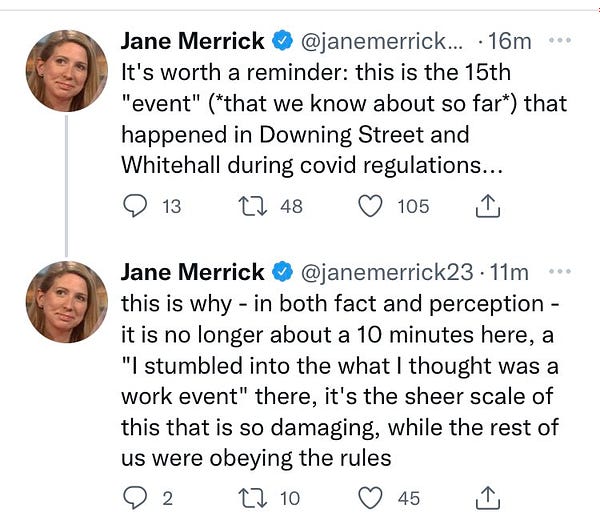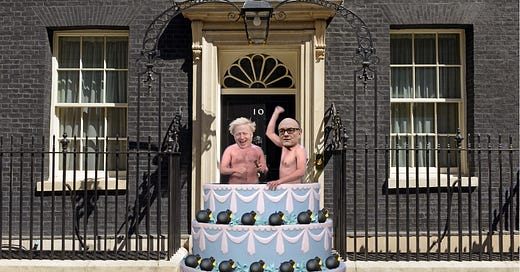A circle jerk observed
Perhaps people would trust journalists more if the industry loved itself less.
The Observer magazine just about sums him up
E.g. self-satisfied, smug
— How I Wrote ‘Elastic Man’, The Fall (1980)
Mark E. Smith, The Fall’s presiding demonic intelligence, is dead and has been for four years now. He got out while the going was awful; lived with an excess of speed, died on the off-ramp from middle age and left an interesting corpse.
Bits of Fall songs rattle around my head every day. If you’re grabbed by them, it’s like being perverted by language. Every newspaper has headlines that could have crawled from Fall songs, every news bulletin a shard of something Smith could have crumpled up and returned to later at an obtuse angle.
Smith didn’t live to see Boris Johnson in Downing Street but given his occasional claims at lyrical prophecy — “I used to be psychic, but I drank my way out of it” — there are doubtless lines in the Fall’s extensive back catalogue that apply. In fact, as I was writing this, shuffle threw up the group’s reworking of Leadbelly’s Bourgeois Town, in which Smith drawls:
Open newspaper/What do I see/ A politician with kids doing the best for me…
In Sunday gone’s Observer, the story of partygate so far and the press’ role in it was sketched out in media industry aggrandising terms. Like the lyrics to a Peel session performance by The Fall, the noise needs interpretation; there are gaps, allusions, distortions, and feedback throughout.
The writer, Andrew Anthony — who’s written for The Guardian since 1990 and The Observer since 1993 — opens with some shaky scene-setting:
Perhaps the most surprising aspect of the crisis surrounding Boris Johnson is just how long it has taken to happen. Almost by definition, any party to which 100 people are invited is not a secret event. And that “almost” can be dispensed with if the invitees work in politics. Yet for more than 18 months, the public was ignorant of the prime minister’s attendance at the infamous No 10 social gathering on 20 May 2020 – and indeed of the gathering itself.
It is only surprising if you ignore the incestuous closeness of the political press pack and the people they cover, the revolving door that makes hacks into advisors and politicians into contributors, and the dominance of access over investigation in breaking stories.
The familiar line that hacks heard nothing but whispers about a rash of rule-breaking events (at least 15 of them) got a run out again…
… The journalist who first wrote about Downing Street parties during lockdown, the Daily Mirror’s political editor, Pippa Crerar, initially heard about them almost a year earlier. She said it took 11 months to stand up the story…
… but there’s also a hint of saying the quiet bit a little too loudly…
… though the Mirror may also have been waiting for an opportune moment. With Johnson under pressure after the Owen Paterson fiasco, that moment duly arrived.
Aside from “The Owen Paterson Fiasco” being a perfect Fall album name that never was, the idea that journalists and editors knew nothing about the goings-on in Number 10 becomes more ridiculous with each successive revelation, particularly as it’s clear that the details are being drip-fed to them.


Talking about how newspapers wait for “an opportune moment” to release their stories is admitting how much news is made rather than reported. Partygate is not a news story but a news event, a product of tactical leaks drawn out for the maximum possible effect.
Anthony’s Observer piece is an advertorial for newspapers:
The key point, however, in the age of social media, is that the story didn’t leak. It’s said in Westminster that a couple of Tory-supporting journalists also attended gatherings in Downing Street. Rumours circulated.
Nevertheless, there were no Instagram photos or revelatory blog posts, no viral internet rumours. New media played little part in uncovering the egregious flouting of government rules… rather, what finally brought to public attention that boozy May Day and the various other lockdown parties was the work of the often-derided mainstream media.
But that’s not it. What brought the stories to the media which ‘brought’ them to the public was leaking by disgruntled figures in government and out of it. The newspapers and broadcasters didn’t dig up the details but rather had them dropped into their laps. The right-wing papers stuck with this story because they no longer consider Boris Johnson to be useful.
The latest revelation — Boris Johnson’s 2020 Cabinet Room birthday party aka Partygate XVI: Cakepocalypse — came via Paul Brand at ITV News, who was also handed the video of Allegra Stratton’s chucklesome press briefing practice.
The dread phrase “ITV News understands…” makes several appearances in the story, which translates as “someone told us but we have to pretend it just dropped from the sky”. And there’s a good chance that the ultimate source resembles a Mekon who insists on getting dressed in the dark.
The birthday story is special because the Scandal Cinematic Universe now features crossovers, with interior designer Lulu Lyttle from Wallpapergate making a cameo in Partygate. We’re still waiting for Sue Gray’s solo outing, which is now going to be a mini-series due to the sheer amount of material.1

On Sunday night, the Prime Minister’s sister, Rachel Johnson, used her LBC show — and isn’t that a wonderful sign of the health of British media and politics? — to claim that Dominic Cummings “has a grid with ‘bomb emojis’ on each day… and going on after ‘Sue Gray Day’.” Talk of the Cummings grid — another lost Fall song title — has been hinted at in other radio discussions and in interminable long reads about Johnson.
In one of those narrative-heavy accounts from November 2020, covering the last days of Dominic Cummings in Downing Street, Tim Shipman quoted an anonymous source who claimed:
Dom’s favourite gesture at the moment in conversations is to pull the pin from an imaginary hand grenade and then throw the grenade over his shoulder as he leaves the room. Everyone is braced.
The imaginary grenade tosser is now hard at work and Westminster hacks are patting themselves on the back for recording the explosions.
Stories ranging from Boris Johnson allegedly funnelling public money to Jennifer Acuri, a woman with whom he was having an affair, while Mayor of London to corruption in PPE procurement got far less coverage because the right-wing papers didn’t pursue them with any vigour. Today, the birthday cake claims are drowning out a minister resigning in protest over what he calls the government’s “lamentable” response to fraudulent Covid loan claims.
The Observer quotes Jane Martinson, former Guardian Head of Media, and current Marjorie Deane Professor of Financial Journalism at City, University of London, who says:
The relationship between Fleet Street and Downing Street is an interesting one, but we wouldn’t have found out about any of these stories without journalists.
That line glosses over a morass of conflicts of interests and failings to make a point that could be reframed as: “We wouldn’t have heard these whispers if it weren’t for these handy megaphones.”
The emergence of the partygate stories led to a scramble by the rest of the press pack to have their own revelations. Each successive story has become increasingly tenuous, framing the debate around Talmudic interpretations of the rules and laws in place at any particular time.


Last week, Edelman’s Annual Trust Barometer — itself to be taken with enough salt to melt a slug given the source — claimed that only 35% of British people say they trust the media; that’s down two points on last year and even lower than the US (39%). Yet, British journalism is still characterised by back-slapping and wagon-circling. For example, last night a BBC reporter tweeted:
Boris party stories make me proud of the British press pack. Absolutely relentless. Can’t help feeling the same behaviour from Trump would’ve escaped the news agenda in a matter of days.
That ignores the fact that many previous stories of fecklessness, corruption and contempt on Boris Johnson’s part did dissipate “in a matter of days” and that the British media did not subject the Prime Minister to sustained scrutiny before he entered Downing Street. In fact, the majority of British newspapers strongly promoted Johnson as a suitable candidate for the highest office.
Hacks are congratulating themselves on uncovering the minutiae while refusing to discuss the macro issues. The Observer analysis noted the Mail’s attacks on Johnson and its front-pages targeting Keir Starmer and concluded:
… it seems Ted Verity, the editor of the Mail, perhaps with the support of his editor-in-chief, Paul Dacre, has done the moral calculus and decided that an untrustworthy and hypocritical PM is preferable to the alternatives – in particular, a resurgent Keir Starmer.
But the answer is more obvious: The Daily Mail wants the continuation of the Conservative government but just not with Boris Johnson at its head. Similarly, the surprise that The Daily Telegraph, Johnson’s once and future home, broke the story of parties on the eve of the Duke of Edinburgh’s funeral is foolish.
The Telegraph was far from the first mover. It kept ‘partygate’ off its front page until it absolutely had to acknowledge it. The leaks it received were too juicy to ignore, an opportunity for moral cant and hand-wringing about “her majesty” that fell right in the publication’s sweet spot.
Today’s Sun splashes on the birthday party with a weak headline (You can’t have your birthday cake… and eat it, Boris) and a limp story by Boris Johnson’s current wife’s ex-boyfriend Harry Cole. It follows a week of supportive headlines from the paper, including the particularly peculiar pie front page. Whether The Sun’s Deputy Editor, James Slack — who was still the Prime Minister’s official spokesperson at the time of the birthday party — was there isn’t mentioned.
On the title track of The Fall’s final album New Facts Emerge, Smith sings:
New facts emerge
Horrible new newsmen emerge
Horrible new facts emerge
We could take that as his partygate prophecy: The story rolls on as new facts emerge and we are assured that this is journalism at work rather than excitable stenography. A retweet from Dominic Cummings offers more insight into why than a thousand words of newspaper copy.
Last night, as the birthday party story broke, Cummings retweeted the words of former Tory MP David Gauke2:
The finale of a TV series often sees the separate strands of the story brought together for the denouement. And new we have Downing Street parties, Lulu Lytle, and cakeism all in the same scene.
The Observer magazine just about sums him up…
And is now delayed by the upcoming crime drama featuring Cressida Dick as an accident-prone investigator searching for cake fragments.
Who lost the Tory whip as part of the Cummings-led Brexit machinations.



